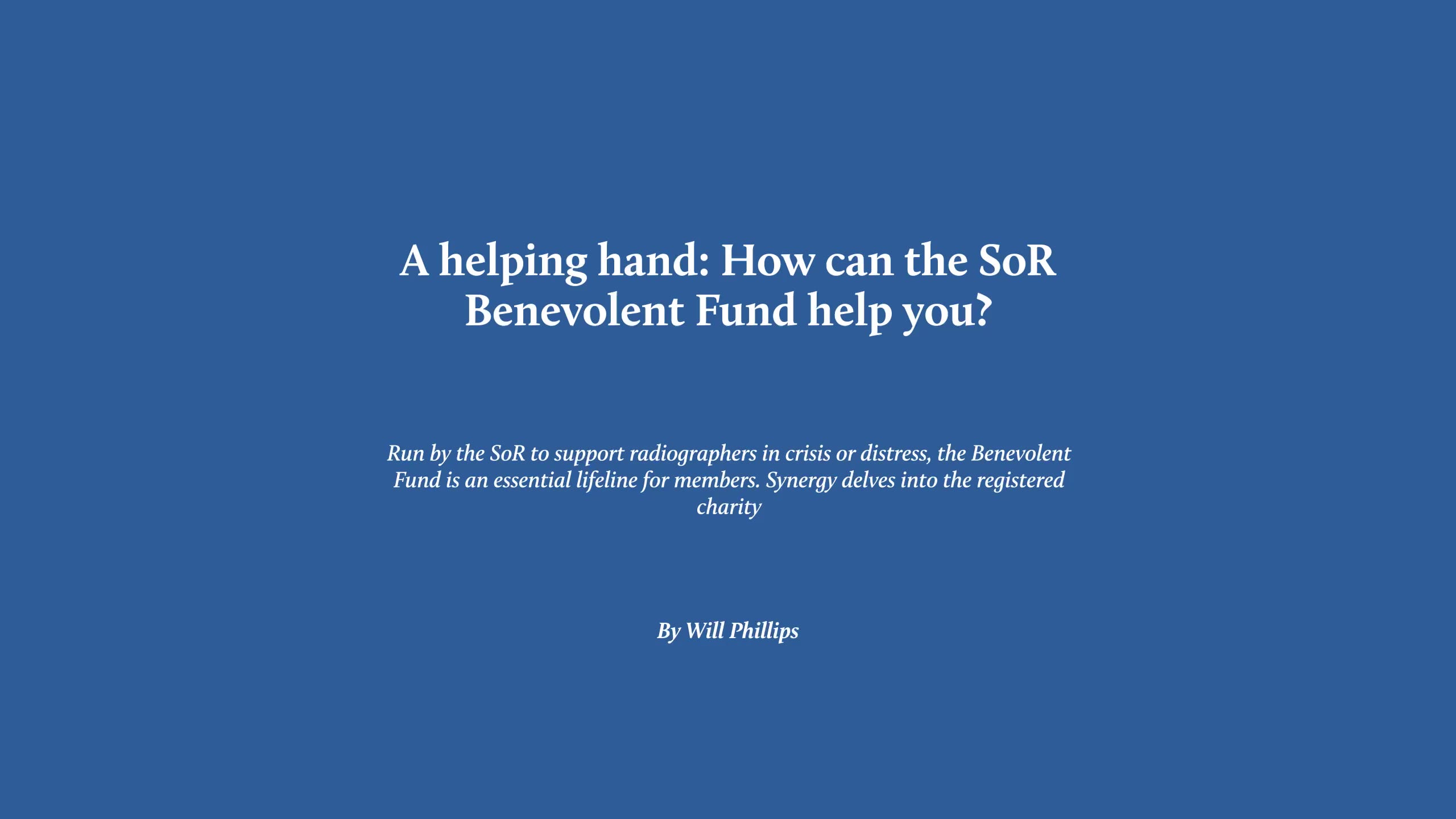
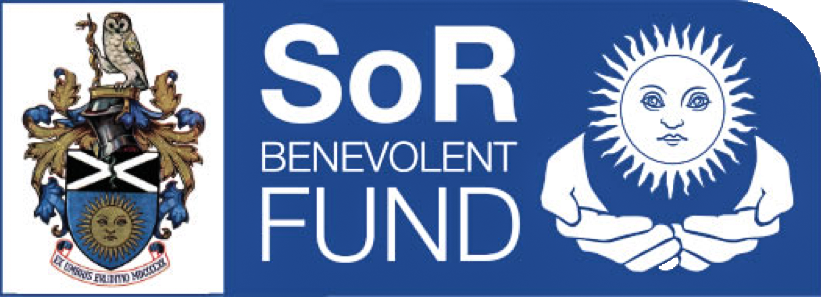
Crisis can come in many forms and radiographers need peace of mind to help them deliver their best care.
The Society of Radiographers’ Benevolent Fund exists to offer precisely that safety net.
Dating back to 1936, the Benevolent Fund was founded to help SoR members going through financial hardship or distress, whether because of redundancy, unemployment, illness, bereavement, disability, accident, or any other kind of unexpected expense.
In the last ten years alone, the Benevolent Fund has helped almost 80 radiographers, by making one-off grants for specific support, or can help to contribute to household bills for a specified period.
Since 2013, these one-off grants have added up to £118,263 in support for radiographers.
Synergy recently caught up with the board of the Benevolent Fund, to find out exactly how important this lifeline for members really is.
“We're here to help people who are either in crisis or distress, if they need our help or if something has gone wrong at some point,” said Alaine Berry, trustee on the board of the Benevolent Fund.
“People who are in that situation might not necessarily think of the Benevolent Fund – I hope some people will, but it's more the people around them we want to reach.
“It might be that someone's in distress and their colleague says, ‘well, have you thought of the Benevolent Fund?’”
“The biggest thing we hear when we talk to radiographers is that they just don’t know the Benevolent Fund is there,” she added. “We’re trying to really prioritise getting the word out. We’ve hardly had any applications in the last couple of years. In a cost of living crisis, we would have expected applications to go up, not down.
“We just want to make sure people are aware that we’re there.”


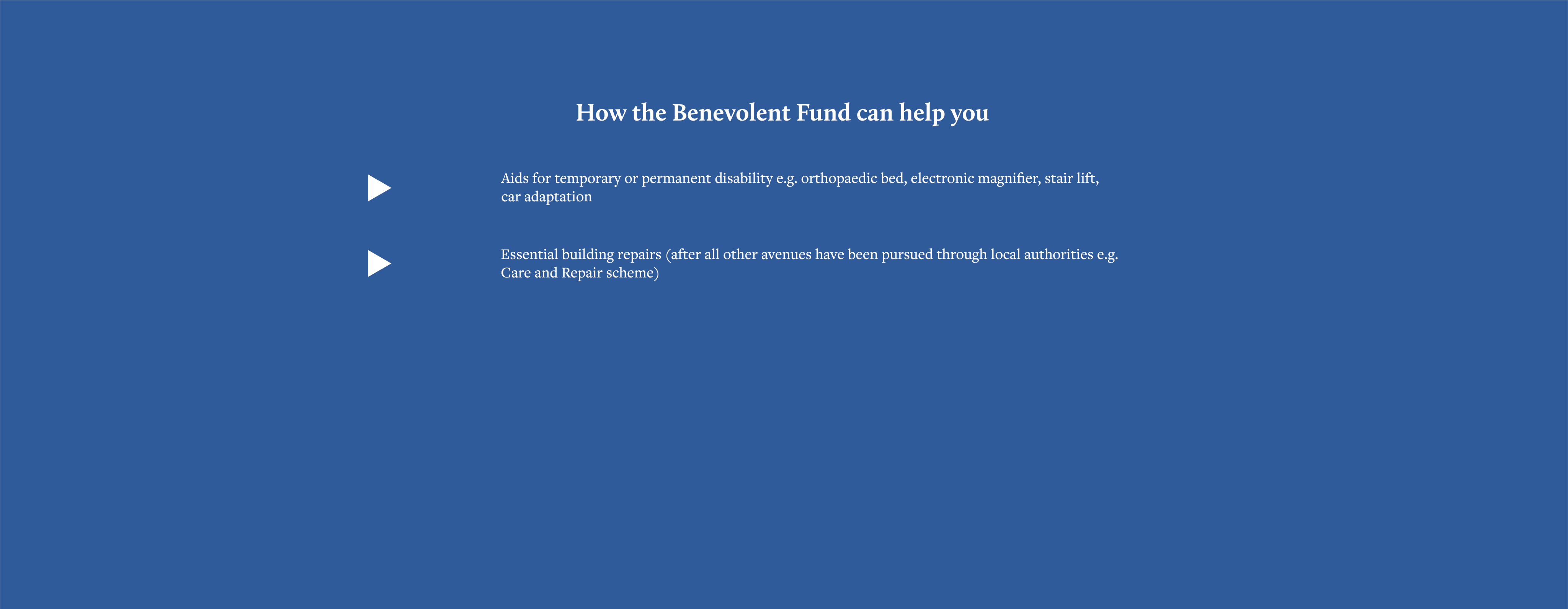
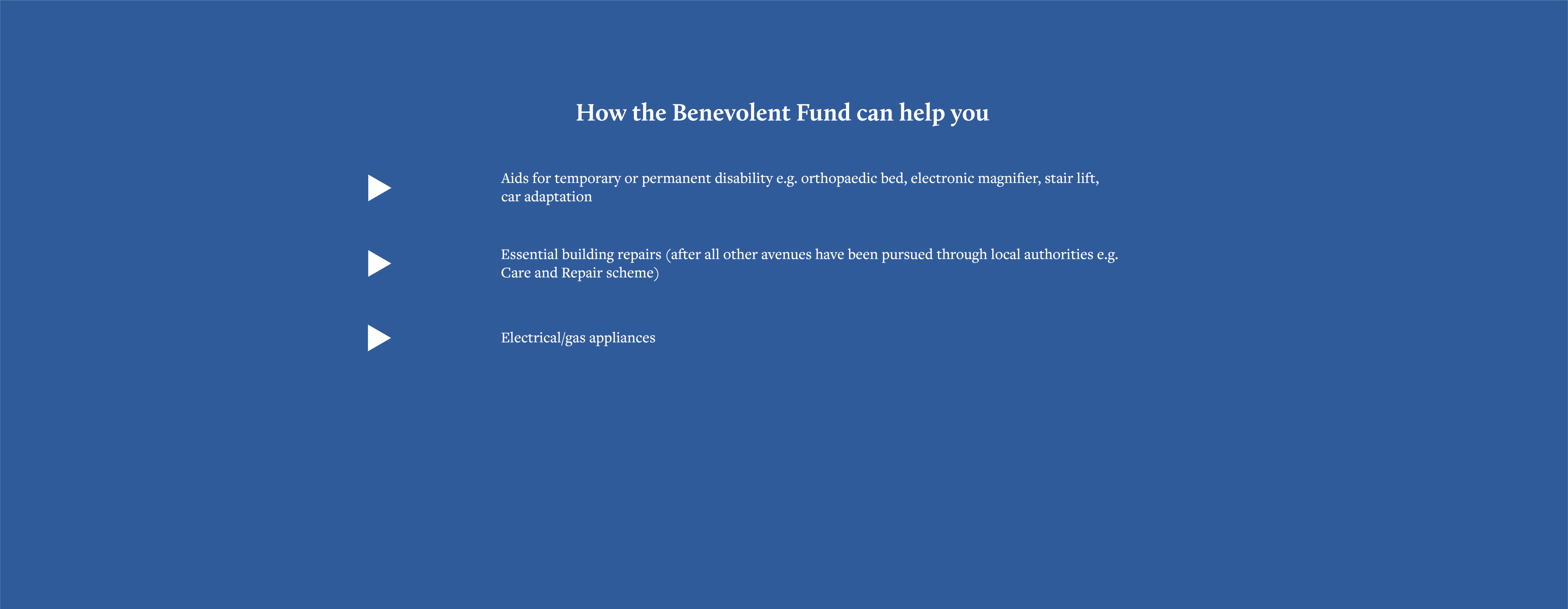
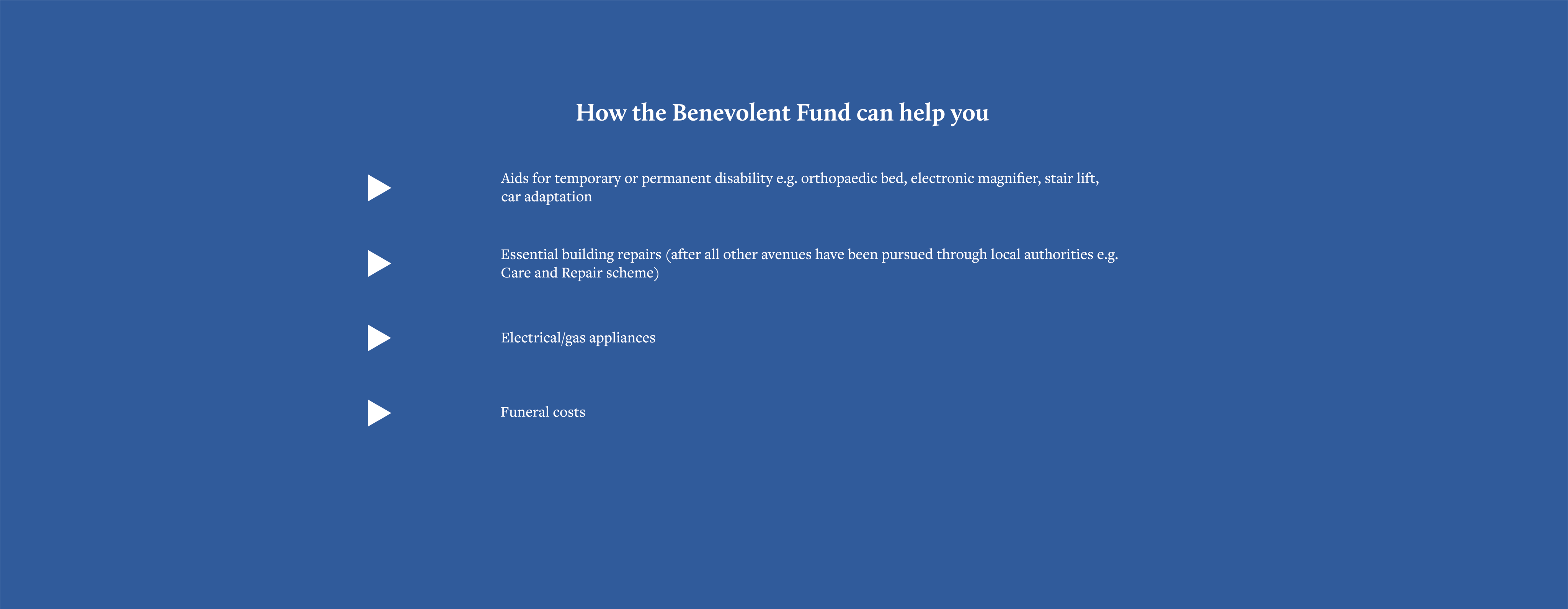
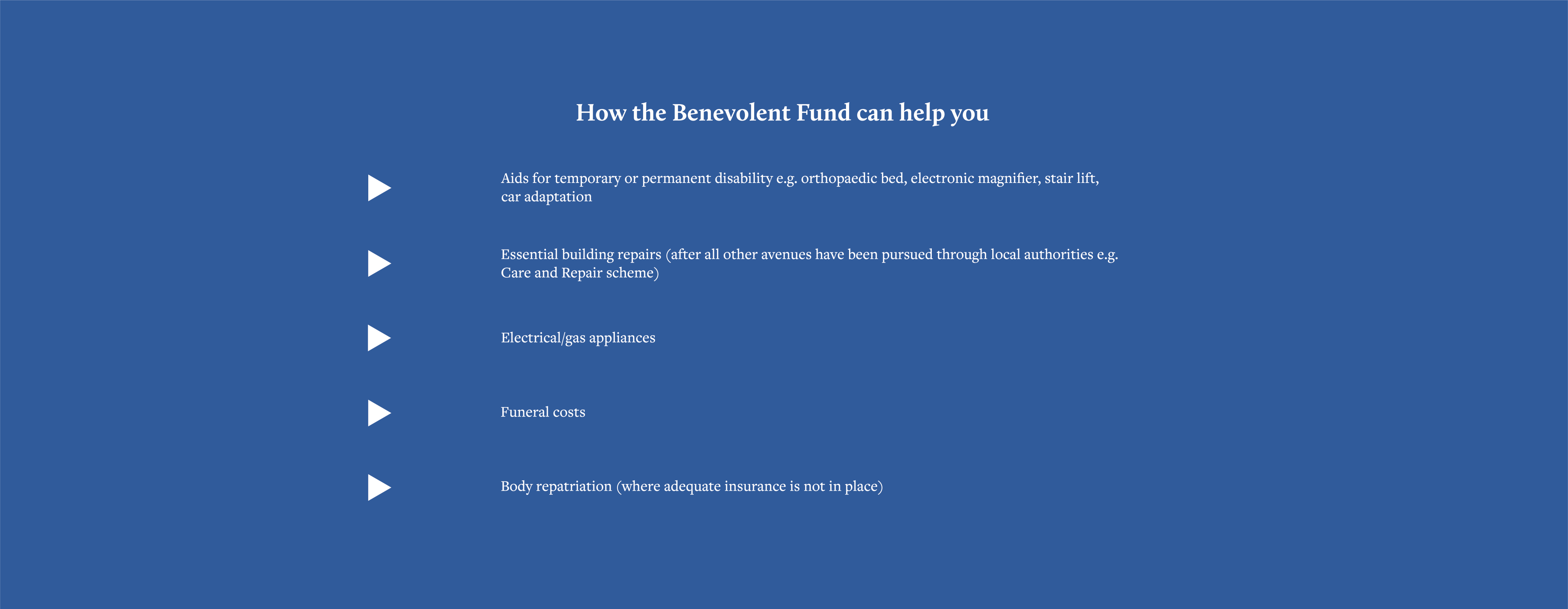
Charitable aid
The Benevolent Fund has been a registered charity since 1983 and is run separately from the SoR while remaining closely linked. It exists to help members and their dependents in their necessitous financial circumstances, whether they are former members, students or retired radiographers.
Alaine told Synergy: “There are radiographers out there that do live hand to mouth, pay packet to pay packet. If they have an unexpected expense crop up – even something as simple as a broken washing machine – that’s when the Benevolent Fund can step in and help.”
The fund has previously refrained from is paying for private medical treatment – however, it has recently undergone a legal review of its underpinning documents, Alaine said, which will hopefully allow the fund to pay for certain mental health treatments.
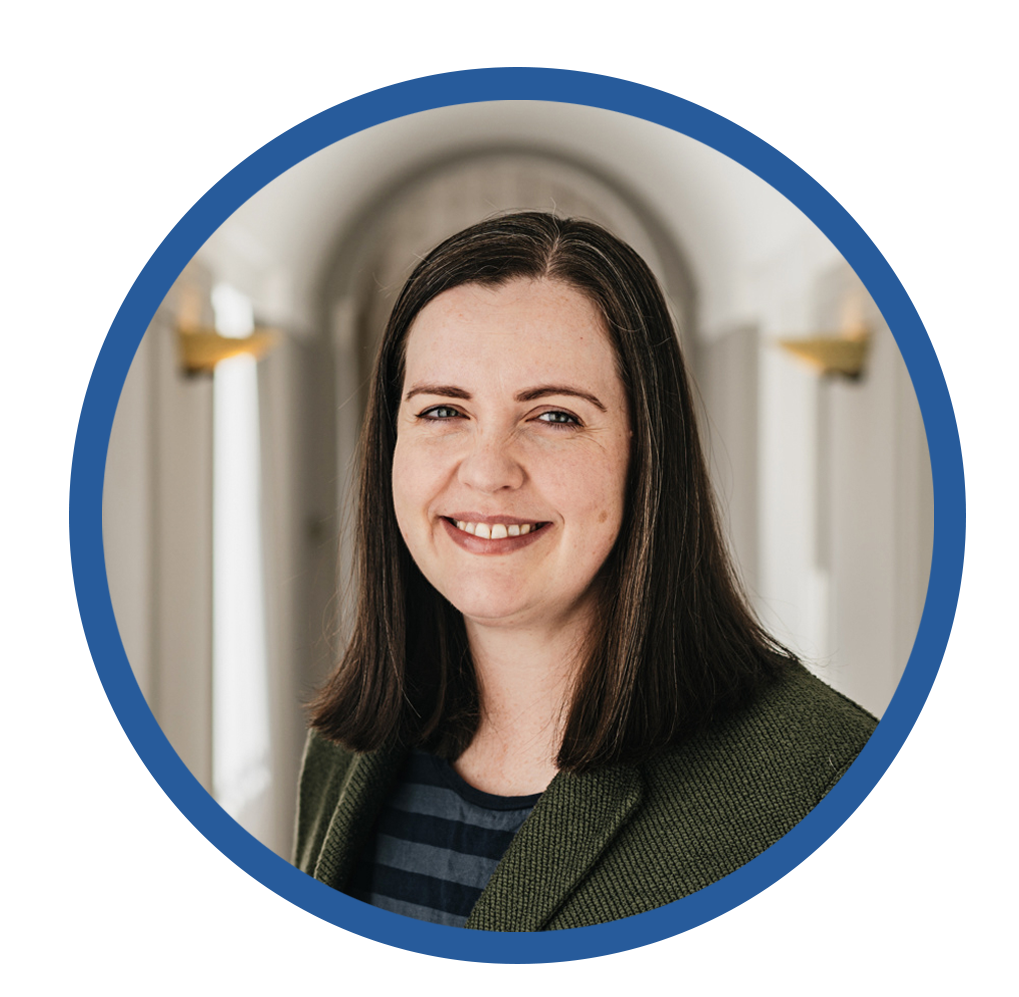
Benevolent Fund trustee and Diagnostic Radiographer, Alaine Berry
Benevolent Fund trustee and Diagnostic Radiographer, Alaine Berry
“We’re acutely aware it’s been a very tough time for everybody the last four or five years, with Covid and now with an extended cost of living crisis,” Alaine added. “For anyone that’s been to see a GP, and the GP has referred them on for cognitive behavioural therapy or counselling, we’re hoping in the very near future the fund will be able to pay for that, so someone isn’t on the waiting list for 18 months for two years, or even longer.”
Eligibility for application to the fund comes down to membership or former membership of the SoR, as well as the limits placed by the Department of Work and Pensions.
In order to receive aid from the Fund, applicants must not have more than £16,000 in capital holdings.
Other than that, Alaine explained, the process is as straightforward as possible – members simply need to fill in a form to explain their financial circumstances, what they’re asking for, and supporting evidence in the form of three months of bank statements and other relevant documents.
The fund is completely supported by donations, though it also has a small investment portfolio, which generates revenue every year.
In recent years, the fund has also received donations from the Society itself – currently, however, it is in a good financial position, Alaine explained, and so has enough resources to support members requiring financial aid.



Working with the SoR
Alaine is a Diagnostic Radiographer working in research at Imperial College London, investigating heart muscle conditions. This involves working alongside different patient groups, including people with schizophrenia, cardiomyopathy or pulmonary hypertension.
She got involved with the Benevolent Fund after seeing an advert for the charity.
She explained: “I just thought it was something I could do. I’ve had a lot out of radiography, far more than I could have imagined.
“I thought the fund would be a good way to repay some of that. I have learned a lot from my fellow trustees, and it is very gratifying to see how impactful the grants we make have been.”
While the Benevolent Fund is mostly separate from the SoR, Alaine said that the Society has done an “awful lot” for the charity.
The fund makes use of some of the Society’s accounting resources, including its financial tea to manage their investment portfolio, and administrators for secretarial duties. Alaine added that Richard Evans, CEO of the SoR, has been a source of a great deal of guidance in helping keep the fund operational.
The Benevolent Fund has also had a presence at various events held by the SoR – Alaine was in attendance at the 2024 Annual Delegates Conference, held in Leeds in April at the Queens Hotel, and she will also be in attendance at UKIO and the Radiography Awards.
Alaine and the six other trustees on the board of the Benevolent Fund are all volunteers from various walks of life and some of these trustees are not radiographers at all, but rather experts who bring different skill sets to the table.
This includes experience in financial management and risk or a background in the benefits system.
The trustee roles involve reviewing applications, ensuring the charity is acting within its own policies, while the other key responsibility is management of the fund itself.
“We don’t always agree [on applications]. Sometimes these decisions are not unanimous, and that’s fine,” Alaine said. “And we obviously all want to manage this money responsibly. There’s a lot of really interesting stuff I’ve been learning. I’d certainly had no experience before this.
“Financial management, reserves, investment policies, managing our portfolio – that’s the added bonus of it, for anyone interested in becoming a trustee. When I first called, I thought I would just review applications. But it’s been really good to have that board experience.”
Brigitte Faubert, another trustee with the Benevolent Fund, explained how her background in industry and business, particularly sales, marketing, membership engagement, lobbying and corporate social responsibility, had given her a lot of tools for helping the fund.
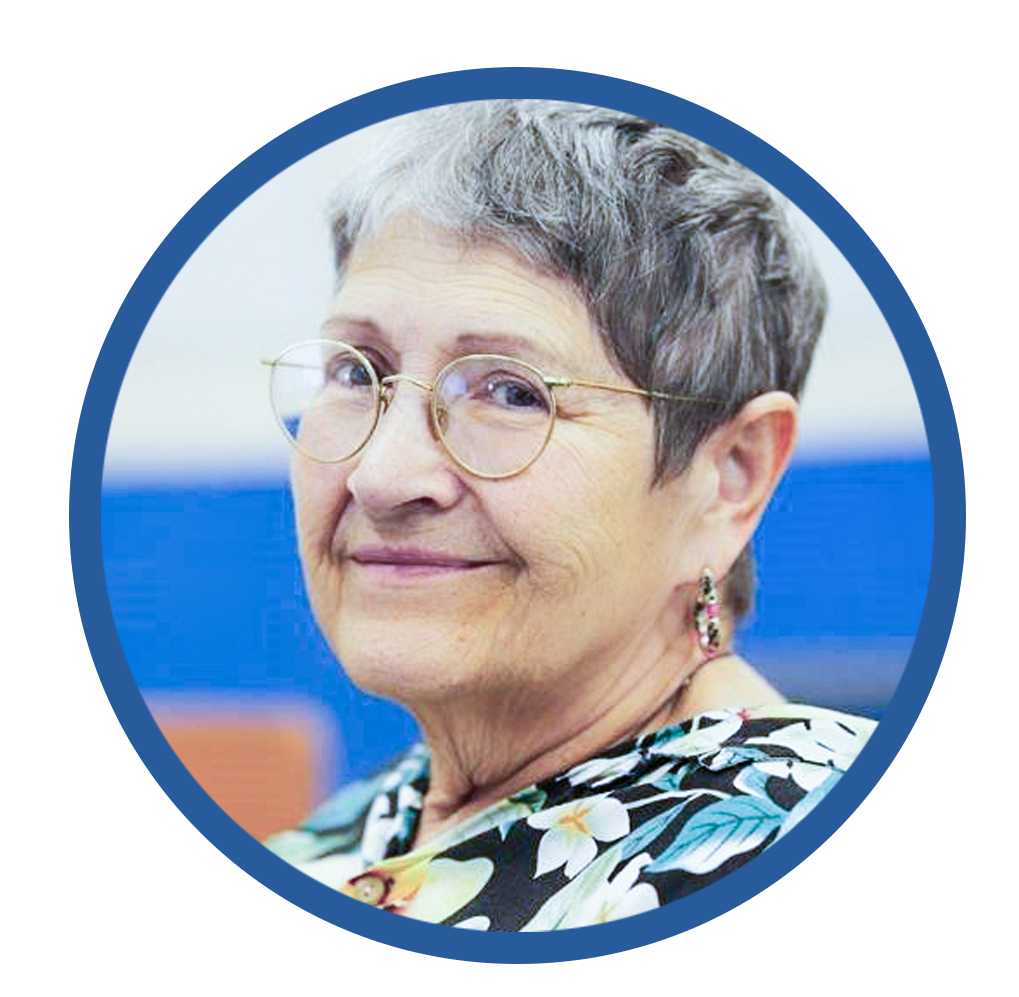
Brigitte Faubert
Brigitte Faubert
She said: “Throughout my career, I've found volunteering to be incredibly fulfilling, and serving as a trustee is a meaningful way to dedicate my time and skills to charitable causes. Trustees play a vital role in leading charities and shaping their operations. For me, it's an opportunity to contribute to causes I'm passionate about while also honing strategic and leadership abilities.
“Over my nine-year tenure with the fund, I've developed a deep appreciation for those who selflessly dedicate themselves and their expertise to serving and caring for others. Knowing that my contributions can help alleviate distress during medical or financial crises, especially among retirees or the ill, brings me immense satisfaction.”
Working with the SoR
Alaine is a Diagnostic Radiographer working in research at Imperial College London, investigating heart muscle conditions. This involves working with a few different patient groups, including people with schizophrenia, with cardiomyopathy and with pulmonary hypertension.
She got involved with the Benevolent Fund after seeing an advert for the charity.
She explained: “I just thought it was something I could do. I’ve had a lot out of radiography, far more than I could have imagined.
“I thought the fund would be a good way to repay some of that. I have learned a lot from my fellow trustees, and it is very gratifying to see how impactful the grants we make have been.”
While the Benevolent Fund is mostly separate from the SoR, Alaine said that the Society has done an “awful lot” for the charity.
The fund makes use of some of the Society’s accounting resources, including its financial advisors to manage their investment portfolio, and secretarial duties. Alaine added that Richard Evans, CEO of the SoR, has been a source of a great deal of guidance in helping keep the fund operational.
The Benevolent Fund has also had a presence at various events held by the SoR – Alaine was in attendance at the 2024 Annual Delegates Conference, held in Leeds in April at the Queens Hotel, and she will also be in attendance at UKIO and the Radiography Awards.
Alaine and the six other trustees on the board of the Benevolent Fund are all volunteers from various walks of life and some of these trustees are not radiographers at all, but rather experts who bring different skill sets to the table.
This includes experience in financial management and risk or a background in the benefits system.
The trustee roles involve reviewing applications, ensuring the charity is acting within its own policies, while the other key responsibility is management of the fund itself.
“We don’t always agree [on applications]. Sometimes these decisions are not unanimous, and that’s fine,” Alaine said. “And we obviously all want to manage this money responsibly. There’s a lot of really interesting stuff I’ve been learning. I’d certainly had no experience before this.
“Financial management, reserves, investment policies, managing our portfolio – that’s the added bonus of it, for anyone interested in becoming a trustee. When I first called, I thought I would just review applications. But it’s been really good to have that board experience.”
Brigitte Faubert, another trustee with the Benevolent Fund, explained how her background in industry and business, particularly sales, marketing, membership engagement, lobbying and corporate social responsibility, had given her a lot of tools for helping the fund.

Brigitte Faubert
Brigitte Faubert
She said: “Throughout my career, I've found volunteering to be incredibly fulfilling, and serving as a trustee is a meaningful way to dedicate my time and skills to charitable causes. Trustees play a vital role in leading charities and shaping their operations. For me, it's an opportunity to contribute to causes I'm passionate about while also honing strategic and leadership abilities.
“Over my nine-year tenure with the fund, I've developed a deep appreciation for those who selflessly dedicate themselves and their expertise to serving and caring for others. Knowing that my contributions can help alleviate distress during medical or financial crises, especially among retirees or the ill, brings me immense satisfaction.”
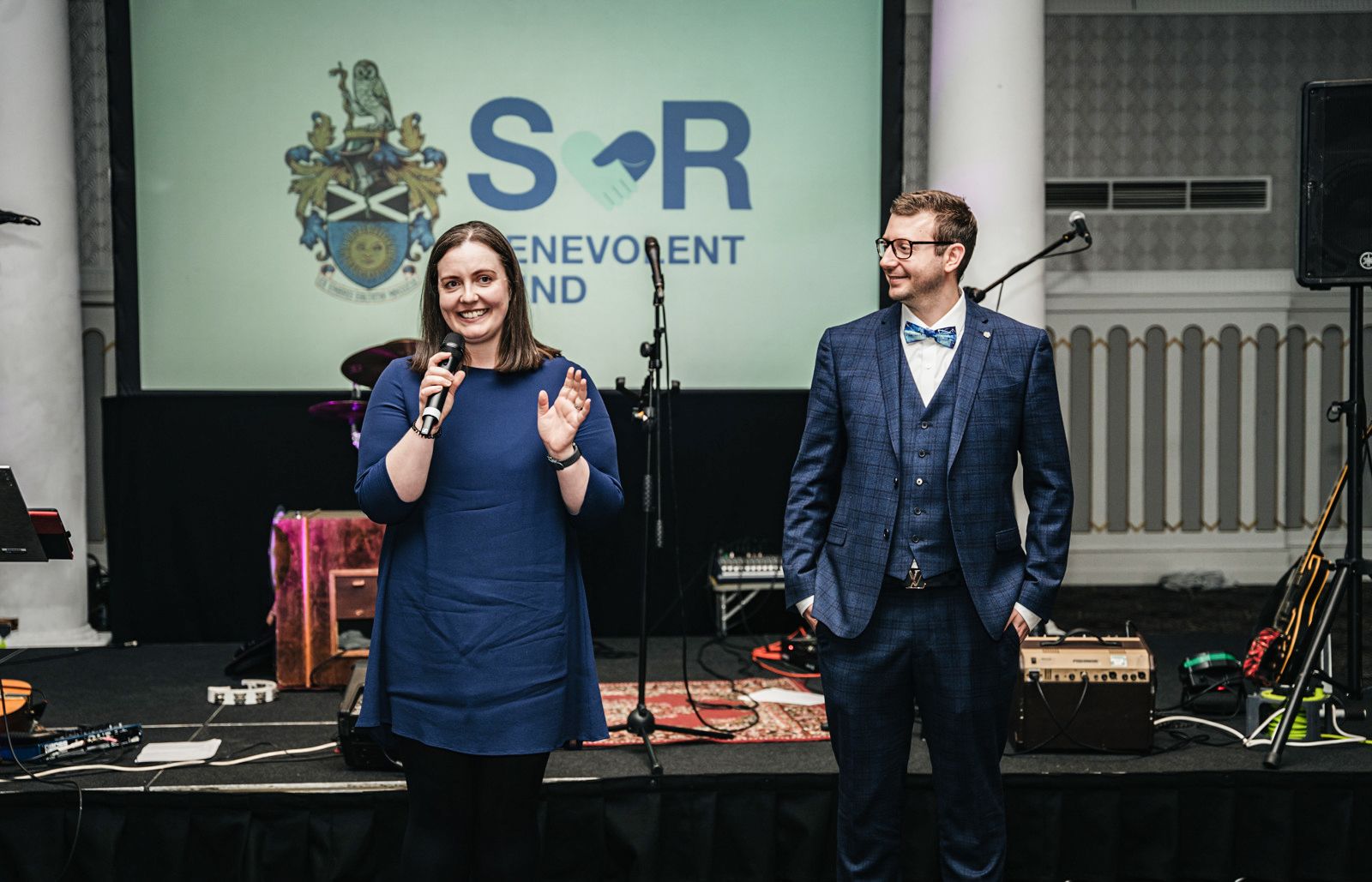

Trustees Alaine and Nick Barlow at ADC 2024
Trustees Alaine and Nick Barlow at ADC 2024
For anyone who thinks they’re struggling
To highlight the support of the Benevolent Fund, SoR members who have received help from the fund recently took part in a webinar in April 2021 to help promote its work.
Andrew Sloan has been a Therapeutic Radiographer since 2011 at Lincoln County Hospital. He worked in radiotherapy for four years, before transferring to clinical trials. Now he works in oncology, on various cancer research trials the United Lincolnshire NHS Trust is running.
Andrew explained: “Several years ago my wife sustained a spinal injury, and it meant that she was paralysed from the waist down. We had to make a lot of adaptations to our home, and one of those adaptations involved laying a new driveway, because it was in such poor condition that she wasn't able to propel herself up and down it in her wheelchair.
“I’m ex-Royal Air Force, so I knew there was a benevolent fund with them – I approached the RAF benevolent fund for some financial support for the driveway. They suggested I also approach the SoR, which I did. I knew they had a benevolent fund, but I didn't know it was something I could tap into. I had read about it, but I thought it was only for members who had been on long-term sickness.
“When we contacted the SoR, and described my circumstances, I was very surprised to learn that we were eligible for some support from the SoR, and they were very generous in awarding us a financial grant to improve our driveway, which was in combination with another grant from the RAF benevolent fund.
“I could not believe how simple it was to do, actually. It was just a couple of emails describing our circumstances, outlining it very basically, and they came back with a couple more questions to get some information. It was very simple, there were no lengthy forms to fill out or anything like that, it really couldn’t have been easier.
“Anybody who thinks they’re struggling a little bit like we were, just go and email the Society, and see if you’re eligible for some support. We were very lucky, and we're very thankful to the SoR for their support. I’m sure if we’re entitled, and we were very kindly given this grant, then other people will be as well.”
For anyone who thinks they’re struggling
To highlight the support of the Benevolent Fund, SoR members who have received help from the fund recently took part in a webinar in April 2021 to help promote its work.
Andrew Sloan has been a Therapeutic Radiographer since 2011 at Lincoln County Hospital. He worked in radiotherapy for four years, before transferring to clinical trials. Now he works in oncology, on various cancer research trials the United Lincolnshire NHS Trust is running.
Andrew explained: “Several years ago my wife sustained a spinal injury, and it meant that she was paralyzed from the waist down. We had to make a lot of adaptations to our home, and one of those adaptations involved laying a new driveway, because it was in such poor condition that she wasn't able to propel herself up and down it in her wheelchair.
“I’m ex-Royal Air Force, so I knew there was a benevolent fund with them – I approached the RAF benevolent fund for some financial support for the driveway. They suggested I also approach the SoR, which I did. I knew they had a benevolent fund, but I didn't know it was something I could tap into. I had read about it, but I thought it was only for members who had been on long-term sickness.
“When we contacted the SoR, and described my circumstances, I was very surprised to learn that we were eligible for some support from the SoR, and they were very generous in awarding us a financial grant to improve our driveway, which was in combination with another grant from the RAF benevolent fund.
“I could not believe how simple it was to do, actually. It was just a couple of emails describing our circumstances, outlining it very basically, and they came back with a couple more questions to get some information. It was very simple, there were no lengthy forms to fill out or anything like that, it really couldn’t have been easier.
“Anybody who thinks they’re struggling a little bit like we were, just go and email the Society, and see if you’re eligible for some support. We were very lucky, and we're very thankful to the SoR for their support. I’m sure if we’re entitled, and we were very kindly given this grant, then other people will be as well.”
During the webinar Peter Beeston-Taylor, a radiographer who qualified in 2007 from the University of Lancaster, explained how the Benevolent Fund helped him following his diagnosis with multiple system atrophy (MSA), a disease similar to Parkinson's disease. Peter had been working at a private hospital, Ramsay Fulwood Hall Hospital in Preston.
Peter, who has since passed away, said: “I heard about the fund through a Society of Radiographers study day in the North West. There were various lectures and fundraising – raffles and things like that, raising money for the Benevolent Fund. Various colleagues I’d not seen for quite a while had heard about my unfortunate disease, and they had set up a JustGiving page, to raise money for a trike, to help me with a mode of transport.
“They said it was worth considering applying to the Benevolent Fund. One of the Council members from the North West, Tom, a clinical tutor at the local trust, spoke to me about it and suggested I apply for it as well.
“MSA, which is the disease that I’ve got, is similar to Parkinson’s. It meant that I was struggling to balance, and I used to be a keen cyclist – I used to ride my bike every day to the trust and to the hospital I now work at. I found I couldn’t balance very well on two wheels. In fact, I broke my collarbone, so I looked into the idea of having three wheels, but [trikes are] quite expensive.
“The Benevolent Fund has really helped me out with a contribution for that, so I could have a mode of transport. I no longer drive a car, and don’t have a licence. This is a way of keeping me mobile and enabling me to get to work okay without having to use public transport.
“I have used it on every shift, and I use it every day. It is my main mode of transport. It’s been life-changing, being able to use it and not having to rely on other people to take me places. I can just do it myself. I’m safe on it, and I’ve had no problems in traffic.
“The Benevolent Fund application process was very straightforward. You just go online and click on a few boxes, and that was done fairly quickly, it just took the course of an evening. There were a fair few documents you had to scan and send in, but I found it very easy and straightforward and I couldn’t believe how quickly they looked at the application and gave me the good news.
“You’ve got nothing to lose. It’s been life-changing. Without it, my life would have been very different. I would have had to give up work, so it’s helped me immensely. I haven’t had to give up the job I love.”
More about the Benevolent Fund
The Society of Radiographers Benevolent Fund is a registered charity (No. 326398) that exists to aid members and their dependants in financial distress.
Eligible recipients can apply for support from the Benevolent Fund here. To be eligible, you must be a member (including student members), former member or financial dependant of a member or former member of the SoR, and have capital or savings (excluding your residence) no higher than the Department for Work and Pensions limit (currently £16,000).
Applicants must provide evidence that they are in receipt of (or have applied for) their full entitlement to statutory benefits before the provision of financial assistance can be considered.
The Benevolent Fund cannot support or replace diminished income on a long term basis. Furthermore, income assistance cannot be given where this would affect an applicant’s entitlement to state benefits.
If you have large debts, the trustees recommend you obtain expert, free, impartial debt advice immediately via the resource available on the Benevolent Fund page and then if help is still needed, submit an application to the Benevolent Fund.
Without donations there would not be a Benevolent Fund. Find out how you can make a contribution to the cause here.
Image credit: Turac Novruzova / iStock / Getty Images Plus
Eva Slusarek
Read more


